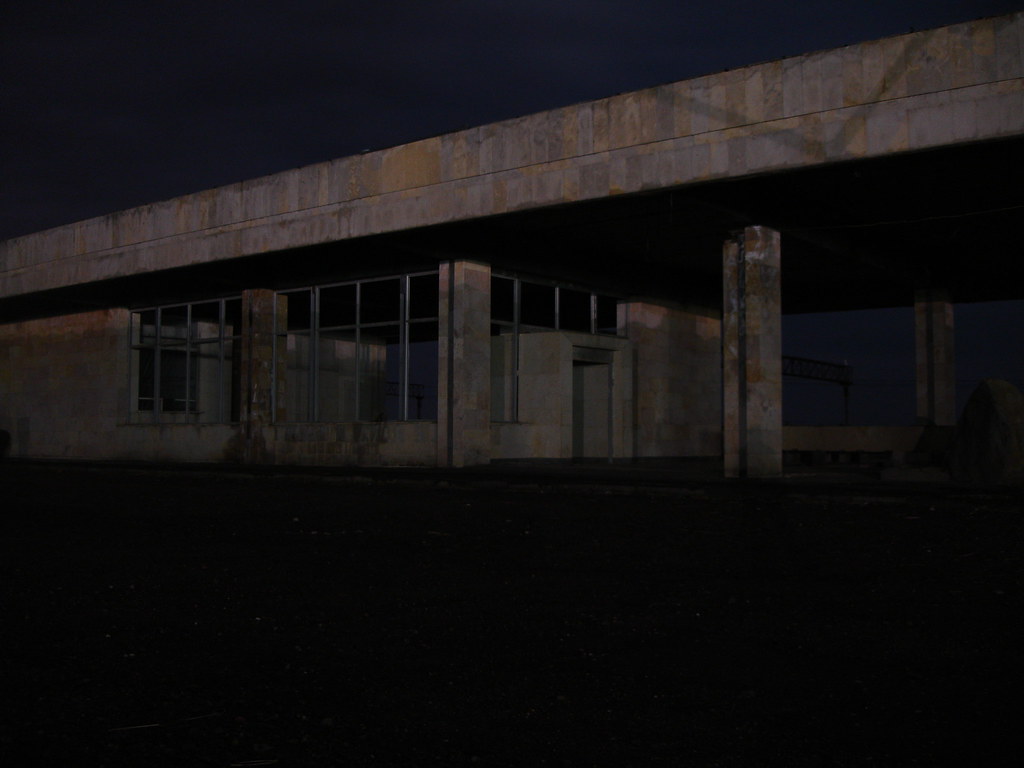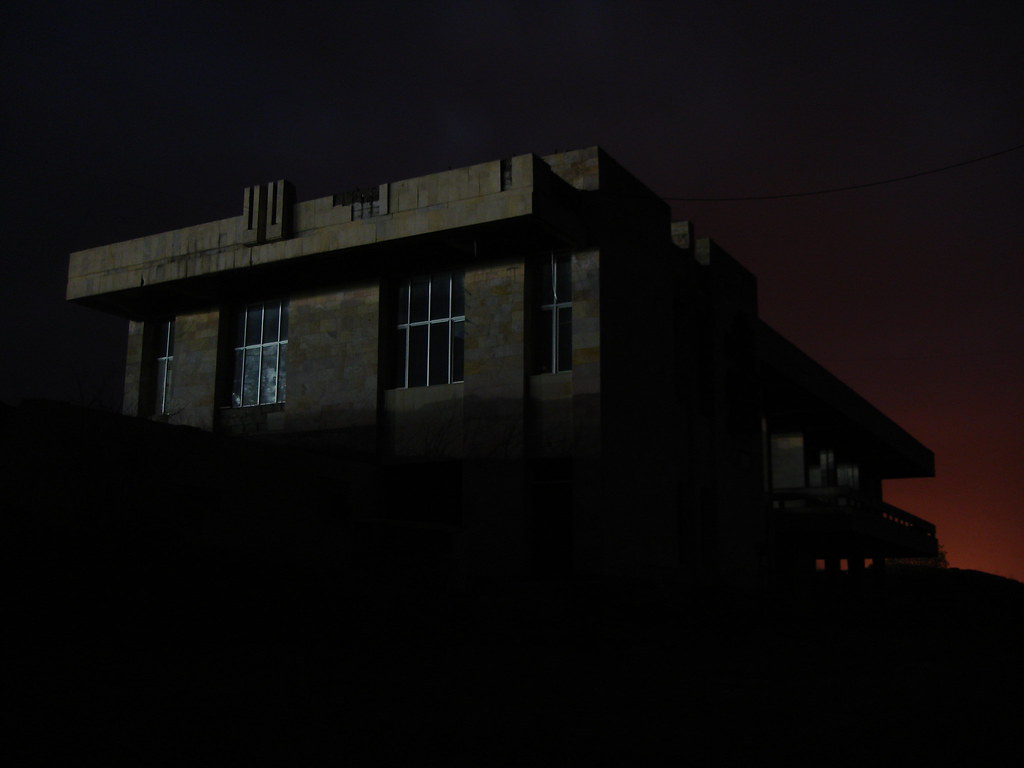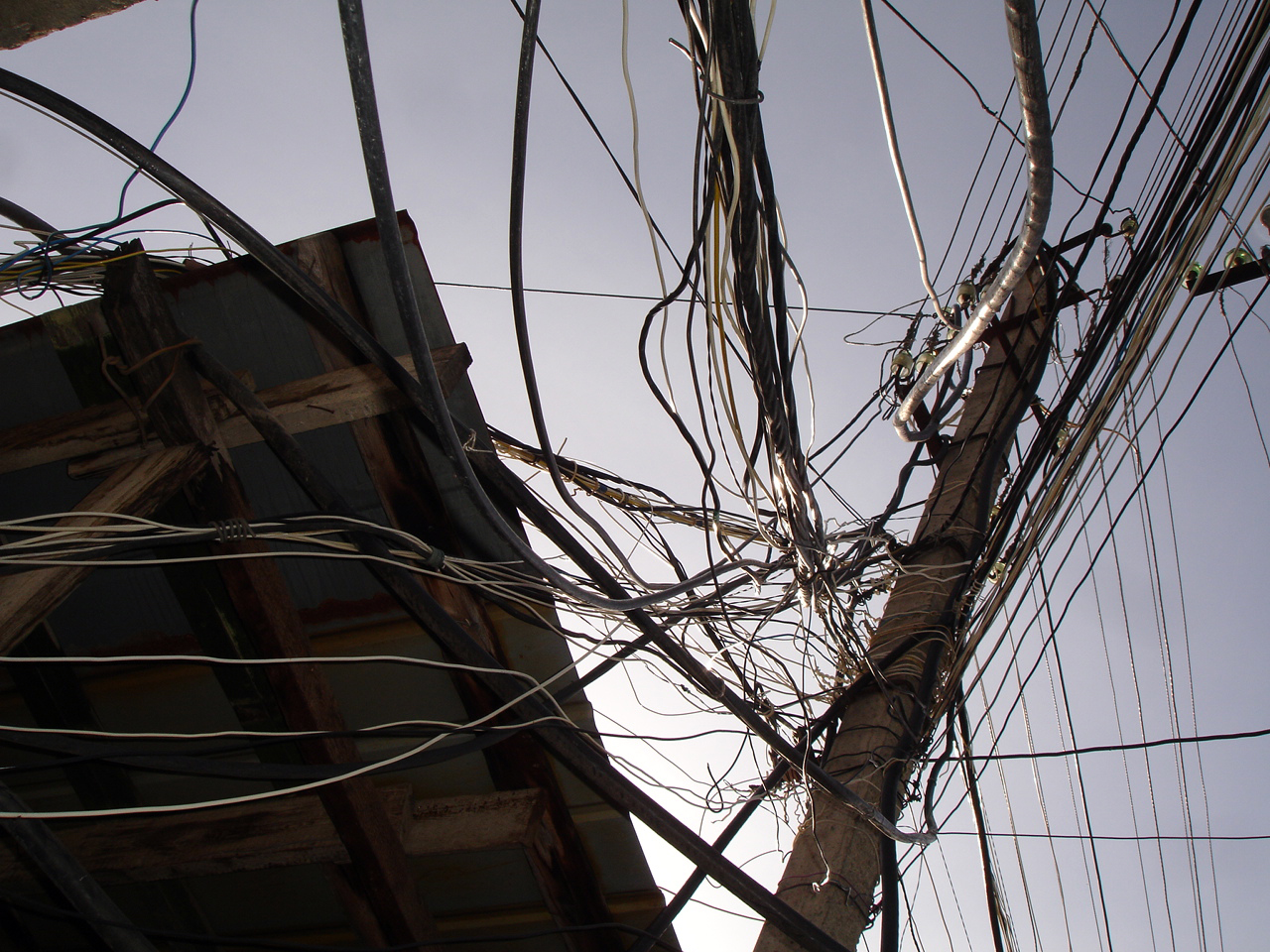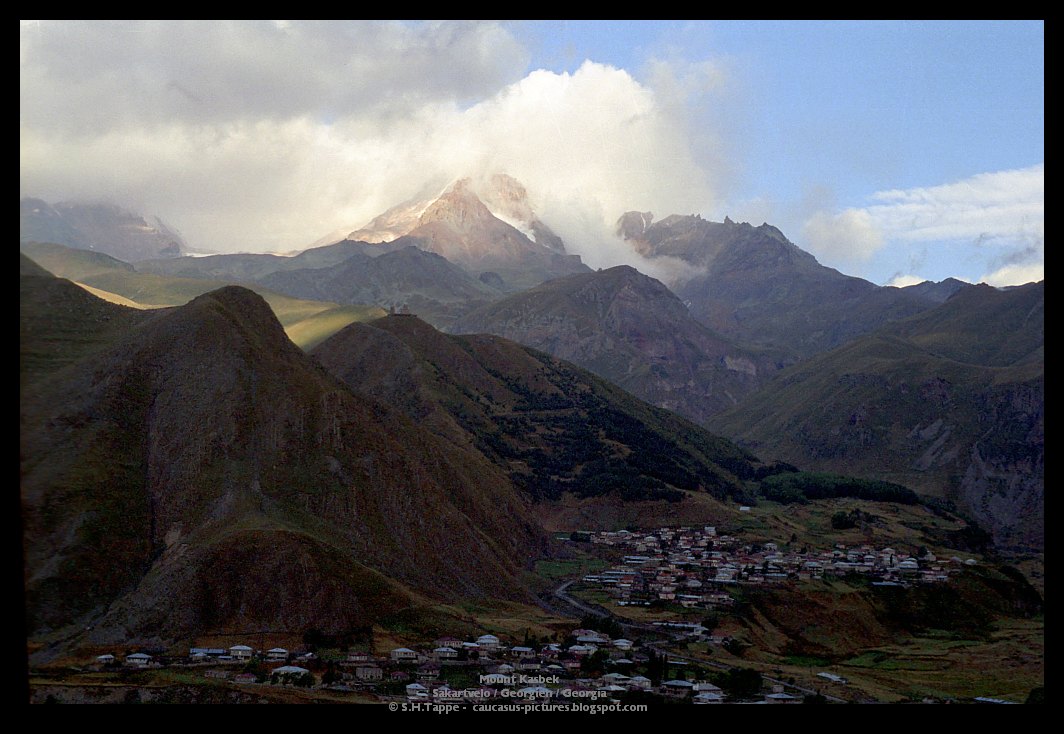Wednesday, January 31, 2007
Das Recht über eine Frau zu verfügen
Von Daniela Haußmann
EM 01-07 · 31.01.2007
Die Unterdrückung der Frau gehört im Kaukasus fast schon zum kulturellen Erbe. Auch nach der Rosenrevolution in Georgien hat sich daran nichts geändert. Manche Männer werden zu regelrechten Peinigern. Die eben erst reformierte Polizei verfolgt ihre Taten nicht. Auf Verständnis brauchen Frauen, die sich wehren, erst gar nicht zu hoffen.
Der ganze Text: Eurasisches Magazin
A service of the Georgian Foundation for Strategic and International Studies
1. Russian-American relations and the Democrats in Congress [excerpt]
2. Russian, Georgian diplomats discuss strained bilateral relations
3. Bezhuashvili, Russian ambassador discuss bilateral relations
4. U.S. ambassador hopeful of thaw in Russian-Georgian relations
5. Recalled Russian ambassador meets Georgian FM upon return
6. Russian envoy to hand in credentials to Georgian president
7. Russian Prosecutor General's Office requests information on uranium smuggling case
8. Georgia's Uranium Scandal: A PR Campaign For Reunification?
9. Origin of uranium seized in Georgia may never be identified
10. EU mulls new opportunities for breakaway regions
11. Sokhumi names the reason why Turkish journalist was denied entry into Abkhazia
12. Press summary for Georgia's breakaway region of Abkhazia 23-29 January 2007
13. Georgian lawmakers push for replacing Russian peacekeepers in Abkhazia
14. Abkhaz leader voices readiness to meet Georgian president
15. Abkhazia accuses Georgia of involvement in kidnappings in Gali district
16. Georgian Minister Rejects South Ossetian Accusations Over Clashes
17. Saboteurs Or Smugglers? Mysterious armed group's attack repelled in Tskhinvali
18. Meeting of JCC in Tskhinvali suggested
19. Construction of Kars-Tbilisi-Baku railway to begin in June
20. A State Can't Deny A Project On Other's Territory, Ex-Foreign Minister Of Armenia
21. Lithuanian PM To Pay Visit To Georgia
22. No terrorists in Pankisi say Georgian and international experts
23. Prices of Georgian newspapers increase
24. Zourabichvili on Property Confiscation
25. Tbilisi appeal court hearing Khintsagov case
26. Georgian opposition says corruption campaign is selective
27. Georgian protestors demand social benefits be restored
28. Postgraduate entrance exams begin at Tbilisi State University
29. Opposition success depends on unity
30. Jailed singer's family not allowed visits
31. No more free rides: local officials resign after president's flash car crackdown
32. Famous Georgians fight for their flats
33. The White Fox comes out of hibernation
34. Government announces sub-soil bonanza
35. Ex-head of state audit office denies beating prison doctor
36. NGOs to apply to president
full digest: Georgia News Digest - Ansicht in Groups BetaNeu!
Jonathan Kulick, Ph.D., Director of Studies, Georgian Foundation for Strategic and International Studies, 3a Chitadze, Tbilisi 0108, Georgia (Republic), jonathan.kulick@gfsis.org, office: +995 32 47 35 55, mobile: +995 95 33 33 40, USA voicemail: 310.928.6814
 roots music from around the World
roots music from around the World Articles on Georgian Music:
Travel Log of Darbazi tour of Georgia
Tuesday, January 30, 2007

TBILISI OFFICE
The Friedrich-Ebert-Stiftung is a political non-profit making, public interest organization based in Germany with its headquarters in Bonn and offices around the world.
It is committed to the principles and basic values of social democracy in its educational and policy-orientated work and provides platforms for debate on political as well as socio - economic issues.
The Tbilisi Office of the Friedrich-Ebert-Stiftung (Friedrich Ebert Foundation) was established in October, 1994. It's aim is to contribute to the development of the civil society and society oriented market economy in Georgia and to promote better political understanding in Georgian - German relations and to support a continuing dialogue between the two countries on economic, social and legal affairs, and on Europian domestic policy.
Foundation’s work in the Georgia focuses on
* the funding and organization of seminars and study visits, workshops, and round-table discussions in both countries;Our partners include Georgian and German academics and experts, Georgian Parliament, state structures, NGOs, politicians and organizations orientated towards democratic values. By maintaining practical links with these groups in our project work and by offering a wide range of information, the Tbilisi Office aims to foster an increasing exchange between both countries.
* the analysis of current external and domestic issues in German and Georgian politics and provison of information and advisory services;
* the commissioning and distribution of papers and publications;
Promotion of the legislative activites by means of alternative bill;
* the provision of doctoral and post-doctoral fellowship programmes for research in Germany.
Activities 2007
* Georgia and New Neighbourhood Policy of the EU: Action Plan Monitoring Project (in Georgian and English) January - February, TbilisiPartner: Foundation “Open Sociaty – Georgia”, “Courd Aid”* Project: Georgian-Ukrainan Cooperation on EU Related Issues April November, Tbilisi, Kiev Partner: Committee on European Integration of the Parliament of Georgia, EU Affairs Committee of the Verkhovna Rada of Ukraine
* Project: Georgian-Moldavian Cooperation on EU Related Issues April November, Tbilisi, KishinevPartner: Committee on European Integration of the Parliaments of Georgia and Moldavia
* Georgian-Ossetian Newspaper - "Obshaya Gazeta" January-December, Tbilisi, Tskhinvali Partner: Journalists from Tbilisi and Tskhinvali/Info Peace
* Georgian-Abkhazian Newspaper - "Abkhazskii Meridian" January-December, Tbilisi Partner: IDP Journalists from Abkhazia
* Civil Georgia - Internet-magazineJanuary-March, Tbilisi Partner: United Nations Association of Georgia
* Round Tables Meetings Georgian-Abkhazian-Ossetian Dialogue March-November , Tbilisi, Sokhumi, Tskhinvali Partner: Local NGOs
* Project: Development Priorities in Svanetia January – December, Mestia Region, Tbilisi Partner: Mountain-Tourism Center in Upper Svaneti
* Web-Site: “Trekking in Svanetia” January – December 2006, Mestia Region, Tbilisi FES-Initiative Group
* Youth Conference: Development Priorities of South Caucasus April – October, Tbilisi, Baku, Erevan Partner: Caucasian University
* Preparation of the Georgian Trade Union Web-Site January – June 2006, TbilisiPartner: Georgian Trade Union, GTUC
Publications 2007
* Georgia and New Neighbourhood Policy of the EU: Action Plan Monitoring Project (in Georgian and English) January - February, TbilisiPartner: Foundation “Open Sociaty – Georgia”, “Courd Aid”* Project: Civil Georgia - Internet-magazine (in Georgian, English and Russian) January-March, Tbilisi Partner: United Nations Association of Georgia
* Georgian-Ossetian Newspaper - "Obshaya Gazeta" (in Russian)January-December, Tbilisi, Tskhinvali Partner: Journalists from Tbilisi and Tskhinvali/Info Peace
* Georgian-Abkhazian Newspaper - "Abkhazsky Meridian" (in Russian) January-December, Tbilisi Partner: IDP Journalists from Abkhazia
Contact Us
Friedrich-Ebert-Stiftung Cooperation Office for South Caucasus
Friedrich-Ebert-Stiftung Representative Office in Georgia
Address:
App. 7, Bldg. 4, 1st Lane of Chavchavadze Ave. 0719 Tbilisi.
Tel: ( + 995 32) 25 07 28, 91 26 15, 91 26 95
Fax: ( + 995 32) 22 67 27
e-mail: stiftung@fesgeo.org.ge
Staff:
Guenther Fichtner - Head of Co-ordination Office for the South Caucasus
Ia Tikanadze - Country Director Georgia
Ketevan Gvaramia - Secretary, Referent
Irina Seperteladze - Assistant, Referent
Elene Gamtsemlidze - Accountant, Referent
Tariel Tsiklauri - Technical EmployeeRelated Links
International Politics and Society the quarterly Journal of the Friedrich Ebert Foundation for Global Trends, International Relations and Country Analyses with articles in German and English language.
The Center for Strategic Research and Development of Georgia CSRDG - The Center for Strategic Research and Development of Georgia is an independent, non-political, non-profit, non-governmental organization, established in July 1995.
Georgian Foundation for Strategic and International Studies GFSIS is an independent, non-profit organization dedicated to helping improve public policy decision-making in Georgia through research and analysis, training of policymakers and policy analysts, and public education about the strategic issues, both domestic and international, facing Georgia in the 21st century.
Civil Georgia - Internet Magazine An online magazine and information service, based on the principles of independent mass media and views and expertise of the non-governmental sector. The publication has its own network of correspondents and belongs to a non-governmental organization “United Nations Association of Georgia”. Friedrich Ebert Foundation (FES) supports first phase of “Civil Georgia” project.
The South-Caucasus Institute of Regional Security (SCIRS) The SCIRS puts special attention on the security, spiritual and material well being of the inhabitants of the South Caucasus. Thereby it also promotes the continuous, sustainable development of the region as a whole, the creation of a feeling of regional identification and the responsibility for its future. Furthermore it designates itself to issues related to international stability and global security.
Imeretian Regional Youth Association “ASA”Archive
Publications 2001 / Activities 2001
Publications 2002 / Activities 2002
Publications 2003 / Activities 2003
Publication 2004 / Activities 2004
Publication 2005 / Activities 2005
Publication 2006 / Activities 2006
Attached PDF file easily navigable with Bookmarks pane
Archives and associated files at groups-beta.google.com/group/genews/files
1. Russia considers investigating uranium theft
2. "Obvious progress" in Russian-Georgian WTO talks says Russian minister
3. Russia Could Be Guarantor Of Security For Neighbours - Georgian President
4. South Ossetia, Georgia report more shooting overnight
5. Shooting reported in tense Georgian breakaway region; no injuries reported
6. Georgian Minister Accuses Russian Peacekeeping Commander Of Bias
7. OSCE mission refrains from report on S Ossetia incidents
8. S Ossetian youths protest Georgian attack
9. South Ossetia sees second shootout in two days
10. Georgian group tried to slip into S Ossetia – official
11. Police post near Tskhinvali was attacked by Georgian special unit- peacekeeper
12. Moscow studying evidence in South Ossetian incident – diplomat
13. OSCE Chairman Concerned over South Ossetia Incidents
14. Merab Antadze Advises Kokoity To Refrain From Groundless Accusations
15. Russia’s UN Envoy Comments on Abkhazia in Paper Interview
16. Abkhaz Official: Tbilisi’s Demand on Border Control ‘Unreal’
17. Sokhumi government makes another attempt to publish a newspaper in Mingrelian language
18. Georgian citizen accused of espionage jailed in Azerbaijan
19. Turkish journalist not allowed to Abkhazia
20. Georgia creating tension in Gali to prevent "Kosovo option" - Abkhaz FM
21. Abkhazia to publish newspaper in language of ethnic Georgian subgroup
22. Georgia seizes ship with international crew onboard
23. United Javakhk against construction Kars-Akhalkalaki-Baku railway
24. Armenia will hamper construction of Kars-Baku railway by political means
25. Meeting Of Committee Of GUAM National Coordinators To Be Held In March
26. Georgian Opposition Divided On Invitation To Security Council Meetings
27. photo essay: Letter from Tbilisi
28. Windstorms leave thousands without power in Georgia, Azerbaijan
29. Georgia's Ruling Party Replaces Regional Officials
30. David Gamkrelidze Refused Proposal Of President
31. Opposition Concerned over ‘Property Rights Abuse’
32. Population Of Ergneti Village Demands Assistance From Government
33. Researches On Reproductive Health Of Men To Be Published
34. Zurab Noghaideli Meets Heads Of Racha-Lechkhumi-Kvemo Svaneti Region
35. Chairmen Of Local Governments Of Samtradia, Khoni And Tskhaltubo Resign
36. Sulkhan Molashvili will be examined
37. Store near 'Delisi' is not destroyed
38. Rustavi Racetrack may be given to Ministry of Internal Affairs
39. The Girgvliani murder one year on
40. Preserve polyglot Georgia
41. Is Georgia saying nyet to Russian?
42. Fourteen areas rich in mineral deposits to be auctioned
43. Shake-up in local authorities
44. Gamkrelidze urges Burjanadze and Saakashvili to react to expropriation of property
45. Kutaisi Mayor Resigns
46. Street vendors to make a comeback says sakrebulo
full digest: Georgia News Digest - Ansicht in Groups BetaNeu!
Jonathan Kulick, Ph.D., Director of Studies, Georgian Foundation for Strategic and International Studies, 3a Chitadze, Tbilisi 0108, Georgia (Republic), jonathan.kulick@gfsis.org, office: +995 32 47 35 55, mobile: +995 95 33 33 40, USA voicemail: 310.928.6814
The existence of two ‘frozen conflicts’ represents a serious obstacle to the ongoing processesof state- and nation-building. Although it can be argued that a country cannot be democratizedprior to the conclusion of such processes (see section 2.1), such an argument would justifyany kind of setback in the transition towards consolidated democracy. Indeed, Tbilisi seems tocompensate for the existence of the separatist territories with the expansion of presidentialpowers. But stability is not equal to strong ‘stateness’ in the sense of demonstrating executivestrength. In fact, there should be a balance between the different bodies of government, betweendifferent interests, between center and periphery through the creation of stable institutions ofchecks and balances, by building up strength in the sense of capacity in order to create a morestable power base and to extend state authority to the periphery. The latter is most likely to beachieved by a decentralization strategy. After all, the unfinished processes of state- and nation35building are not Georgia’s main constraints to further democratic consolidation. The more pressingproblems concern bad governance and the mismanagement of state capacities. Moreover, itcould be argued that promoting democracy contributes to nation-building. Participation, a coreelement of democratic rule, would be a good example in this regard. In order to build up acommon identity, equal rights to participate in national political life ought to be created for allcommunities in Georgia. Furthermore, a strengthening of the state is closely related to conflictresolution since a weak state enables the perpetuation of the shadow economy and smuggling,which, in turn, foster the interests of conflict entrepreneurs to maintain the status quo. In turn, astate with a better performance would provide incentives for the breakaway republics to re-integrate.Addressing state capacity in general could decrease the conflicts’ profitability and increasethe value of being part of a more prosperous Georgia. This could be achieved by tackling corruptionand clientelism, where some progress has already been made, targeting social change andstrengthening civil society in addition to the promotion of good governance and the rule of lawin general.But this is a long-term strategy and, as a matter of course, the settlement of Georgia’s‘frozen conflicts’ even then is not that easy. To constructively ‘unfreeze’ them in the short-termis unrealistic or even impossible after the recent crises that destroyed any residual confidence.Therefore, in addition to a soft promoting-good-governance approach, long-term confidencebuildingefforts are desperately needed.However, as Table 5 shows, any approach—especially the building-up of mutual confidence—would also have to take Russia into account. The non-violent resolution of the crisis inAjara—although significantly different from the secession conflicts—has shown the kind offruitful results a rapprochement between Tbilisi and Moscow can achieve. Thus, the internationalcommunity should help improve bilateral Georgian-Russian relations by providing incentivesfor a co-operation with Russia. The EU, in particular, appears suited to this task althoughits policies towards Georgia have so far been rather incoherent and unsystematic. Nevertheless,the EU included the Southern Caucasus states in the European Neighborhood Policy and Georgiahas a strong interest in a closer co-operation with (and even accession to) the EU. Furthermore,to engage and build a strategic partnership with Russia is one of the EU’s main objectives. Whilethe EU and Russia already co-operate on a variety of issues, including the modernization of Rus36108 EU-Russia relations, at: http://europa.eu.int/comm/external_relations/russia/intro/ (accessed 12/2005).sia’s economy, security issues, and questions of the environment, they have “every reason to stepup co-operation [… and] engage in many other areas, including the cooperation in the SouthernCaucasus.”108 Against this background, Europe should be more capable of taking a mediatingposition, of providing incentives, and of conditioning assistance. Brussels is also experienced inthe promotion of good governance in the enlargement process and can build on that with regardto the new neighborhood. However, the EU should not get directly involved in conflict resolution,as hoped for by Tbilisi. With the deadlocked situation in the conflict zones, there is no specificadded value that Brussels could provide for the negotiation processes. It has already steppedup its indirect role in the conflicts by financially supporting efforts made by the OSCE and theUN and strengthened the mandate of its Special Representative for the South Caucasus. The EUshould therefore further strengthen the instruments already at its disposal and use them morecoherently instead of creating new ones. The OSCE and the UN should step up their cooperationand coordination with other relevant internal and external actors like the Council of Europe.
full pdf-document: Diversity, Conflict, and State Failure: Chances and Challenges for ...
Dateiformat: PDF/Adobe Acrobat - HTML-Version
more by Pamela Jawad
Europe’s New Neighborhood on the Verge of War
What role for the EU in Georgia?
PRIF Reports No. 74
© Peace Research Institute Frankfurt (PRIF) 2006
Correspondence to:
PRIF Leimenrode 29 D-60322 Frankfurt am Main
Telephone: +49 (0)69 95 91 04-0 Fax: +49 (0)69 55 84 81
E-Mail: jawad@hsfk.de Internet: http://www.prif.org
ISBN: 3-937829-37-7
Euro 10,-
Contents
1. Introduction: Europe’s New Neighborhood on the Verge of War 1
2. Territorial Disintegration in Georgia 5
2.1 Georgia’s Conflict with South Ossetia 6
2.2 Georgia’s Conflict with Abkhazia 9
2.3 Intermediate Conclusion 12
3. EU Interests and Activities in Georgia 13
3.1 The EU’s Interests in Georgia and the South Caucasus Region 13
3.2 EU Activities in Georgia 18
3.3 Intermediate Conclusion 28
4. Conclusion: What Role for the EU in Georgia? 30
Link: http://www.hsfk.de/downloads/prif74.pdf
List of Abbreviations 32
Appendix: Map of Georgia 33
Pamela Jawad ist wissenschaftliche Mitarbeiterin
FG: Internationale Organisation, Demokratischer Friede und die Herrschaft des Rechts
e-mail: jawad[at]hsfk.de
Ausgewählte Publikationen
• Diversity, Conflict, and State Failure Chances and Challenges for Democratic Consolidation in Georgia after the "Rose Revolution", 2006
• Europas neue Nachbarschaft an der Schwelle zum Krieg Zur Rolle der EU in Georgien, HSFK-Reports, Nr. 7, 2006
• Europe’s New Neighborhood on the Verge of War What role for the EU in Georgia?, PRIF Reports, No. 74, 2006
• Democratic Consolidation in Georgia after the "Rose Revolution"?, PRIF Reports, No. 73, 2005
"In Playing Fields thematisiert Jens Liebchen das Große Spiel unserer Zeit in den ehemaligen Sowjetrepubliken rund um das Kaspische Meer - das Gebiet mit den weltgrößten noch nicht erschlossenen Reserven von Öl und Gas. Reist man in diese Region, wie Liebchen es getan hat, so wird man jedoch kaum etwas von der verzweifelten Suche sehen. Er könnte Bohrtürme fotografiert haben oder einige der Umweltschäden, die die Ölindustrie verursacht, aber das wäre eine gar zu direkte Aussage, statt dessen hat er Bilder mit subtilen Anspielungen geschaffen.
Die Politik kreist am Kaspischen Meer um Energie. Und so kreist auch eines der metaphorischen Leitmotive, die Playing Fields durchdringen, um die primären Quellen der natürlichen Energie und damit um den Ausgangspunkt der Fotografie - das Sonnenlicht. Liebchen verwendet Sonnenlicht und Schatten, um den Unterschied zwischen Licht (Energie) und Schatten (Mangel an Energie) zu veranschaulichen und so den Hauptgrund dafür ins Bild zu setzen, warum die Supermächte dort am Kaspischen Meer präsent sind. Ein rechteckiger Schatten zum Beispiel sieht aus wie eine in die Erde eingelassene Falltür, die in tiefere Regionen führt, wo das Öl und Gas im Zentrum des Großen Spiels angesiedelt sind.
Unter der abstrakten Ruhe der Bilder liegt in Playing Fields ganz augenscheinlich ein Gefühl der Bedrohung. Manchmal kann es für einen Fotografen anregend sein, das Unsichtbare zu fotografieren. Hier jedoch ist das Unsichtbare eine Kraft, ein greifbares, unheilvolles Wesen. Alles erscheint friedvoll und irdisch, aber die bedrohliche Gegenwart, auf die Jens Liebchen beredte Fotografien anspielen, deutet ganz sicher auf eine nicht weniger bedrohliche Zukunft." Gerry Badger, European Photography, Nr. 78, Vol. 26, Issue 2, Winter 2005/2006
Presse: mehr zu Jens Liebchens Fotografien
Homepage: J. J. Heckenhauer OHG
Galerie J.J. Heckenhauer, Brunnenstr. 153, 10115 Berlin, Deutschland
Fon: 030 . 44031145, Fax: 030 . 44034009
Monday, January 29, 2007



 From Tsalka town to the Tsalka railway station takes one hour by foot. To get there, we were told to take the railway. The light comes from a warehouse, the station is behind us.More pictures here.
From Tsalka town to the Tsalka railway station takes one hour by foot. To get there, we were told to take the railway. The light comes from a warehouse, the station is behind us.More pictures here. 
Power Trip Paul Devlin USA 2003. power trip ... „Power Trip verschafft auch Einblicke in den Lebensstil, die Kultur und die Musik der Georgier. ...
Regisseur Paul Devlin beobachtet den Wandel des vormals kommunistischen Landes zur Marktwirtschaft. Und dabei zeigt sich, dass der Titel Power Trip durchaus ... ww.artechock.de/film/text/kritik/p/powtr1.htm
Doch der brilliante Film «Power Trip» ist eine Reise in den real ... Doch der Film des US-Regisseurs Paul Devlin ist so spannend wie lehrreich. ... www.netzeitung.de/entertainment/movie/281753.html
It's a little unbelievable that one of the most entertaining, bracing documentaries of 2003 -- Paul Devlin's "Power Trip" is about electricity. ... www.indiewire.com/people/people_031211devlin.html
Reuters, 26 Jan 2007 20:28:00 GMT
When the Kosovo will be independent than there are problems with Abkhazia and South Ossetia in Georgia. Another aspect of this "problematic of indepence" is the ethnic territory from the kurds ...
Darlan says:
"I don't think there is a ready solution to the Kosovo mess at all, and just cutting it loose, as an independent nation, sets a very dangerous precedent. Especially since both sides have very strong emotional ties to the region (Kossovo was where the Serbs first fought for independence from the Ottoman Turks in the 14th century).
For example, Russia-- which hates the former Soviet Republic of Georgia-- is pressing for both Abkhazia and South Ossetia, two regions of Georgia in which non-Georgians form the majority, to leave Georgia. If Kosovo breaks off from Serbia, then South Ossetia and Abkhazia will probably be pushed to do the same from Georgia.
Furthermore, the Kurds in Turkey would argue very loudly that they deserve the same treatment. While I have a lot of sympathy for the Kurds overall, if the Kurds press for independence-- by the same principle as Kosovo's would-be independence-- then the USA would be forced into an impossible, no-win situation of either supporting the Kurds against our erstwhile Turkish ally, or enraging the Kurds by denying them the same right."
Source: Response to “Kosovo's 'independence lite'”
A service of the Georgian Foundation for Strategic and International Studies
1. Russian City May Be Source for Uranium
2. Uranium May Be From Novosibirsk
3. A New Nuclear Scandal?
4. Lavrov: Uranium Smuggling Case ‘Provocation’
5. Russia says uranium case 'provocation'
6. Putin Begins to Rebuild Relationship with Georgia
7. Russia feels the heat over fuel [excerpt]
8. Gref Upbeat on Georgia WTO Deal
9. Flights to Russia could resume by March
10. Georgian wine producers hope to return to Russia
11. Georgia on the World Map – Part of Europe or Asia? A New Theory for Solving the Frozen Conflict
12. Provocation across the nation-let's stop using the p word
13. Group from Georgia attacks guard posts in S Ossetian capital
14. Tensions flare in Georgian breakaway region after attack wounds three police officers
15. OSCE Chairman voices concern over violence in zone of Georgian-Ossetian conflict
16. Shootout in South Ossetia injures three – reports
17. Georgia calls "misinformation" alleged attack on S Ossetia posts
18. Georgia Tries To Exclude Russia: Interview of Foreign Minister of Abkhazia Sergei Shamba
19. Georgia losing American support on Abkhaz Issue - Nikolai Zlobin
20. Bleak Prospects for Armenia’s Involvement in Karsi-Akhalkalaki-Baku Railway Project
21. Georgian Battalion Is Prepared For Iraq
22. Saakashvili Meets Ruling Party Officials
23. Soso Baratashvili: "An audio tape used as evidence against Batiashvili has been faked"
24. Protest action on Shardeni street
25. Ombudsman against city monitoring service department
26. National Bank's Foreign Reserves Jump 102 Percent
27. Exhibition of Azeri Children’s Paintings Comes to Pirosmani Center
28. B2B - When Politics May not Matter
29. Traders Were Not Allowed To Trade Near The Delisi Underground Station in Tbilisi
30. Traders at the Underground Station "Gotsiridze" Threaten to Hold Demonstrations
31. The Dedoflistskaro Court Earmarked the Ingilos’ Appeal for Wednesday
32. Peasants from the Kakheti Region Cannot Get Their Money for Sold Grapes
33. Kakheti Regional Administrative Board Made a ‘Black List’ of Non-Governmental Organizations
34. Hungry People Went Out Into the Street
35. Kyrgyz Girls Became Trafficked Victims in Gori
36. Installation of Communal Meters Will Cost Too Much for Villagers in the Kartli Region
37. Brucellosis Has Broken Out in Gurjaani
38. Vintage 2006 Is At Court
39. Kakheti Power Distribution Company Blackmails the Population
40. Series of Evictions Have Started in Batumi
41. Taxes Increase, Allowances Are Being Abolished, Suicide Becomes More Frequent
42. Herr’s Problem, Rejected by Government
43. Musicians Warmed by Firewood
44. Life in Eden: Chronicles and Secrets of the Bananebis Ezo
45. New union boss to protect teachers' rights
46. Irakli Kakabadze receives persecuted writers award
47. Veterans go into battle to regain privileges
48. President calls for anti-corruption drive at district level
49. Anniversary of Sandro Girgvliani's murder marked with protest rally
50. Archeological Works to be legally regulated
51. Parties must account for themselves by February 1
full digest: Georgia News Digest - Ansicht in Groups BetaNeu!
Jonathan Kulick, Ph.D., Director of Studies, Georgian Foundation for Strategic and International Studies, 3a Chitadze, Tbilisi 0108, Georgia (Republic), jonathan.kulick@gfsis.org, office: +995 32 47 35 55, mobile: +995 95 33 33 40, USA voicemail: 310.928.6814
This travelogue describes my May 2003 trip through the trans-Caucasus region. I visited all three countries in the region - Azerbaijan, Georgia and Armenia. While this was a fairly short trip (just over two weeks), I covered a fair amount of territory. I've organized this by country, as that seemed the most practical thing to do.
I shouldn't need to say this, but this being the Internet ...
All opinions are mine. Bear in mind that some of my reactions to things could be colored by how I felt on a particular day, how tired I was, etc.. I've tried to point out where I may not be entirely fair for those reasons. Sending me flaming email is not going to alter my opinions. Factual corrections, however, and general comments are always welcome.
Introduction: The Whys and Wherefores
Baku Beyond: Adventures in Azerbaijan
Bread and Toasts in Georgia
Armenia is Closed for Reconstruction
Closing Remarks
Copyright 2003 Miriam H. Nadel
last updated 31 May 2003
Send comments to mhnadel@alum.mit.edu
Konfliktanalytiker Armenien und Deutschland, Bonn
Einführung in die Grundproblematik des Tschetschenienkonfliktes
Ob in Hörfunk, Fernsehen oder in den Printmedien: Die „Krisenregion Kaukasus“ ist in aller Munde. Ungeachtet dieser medialen Präsenz wird die europäische Öffentlichkeit jedoch nur äußerst selektiv und unzureichend über die tatsächlichen Vorgänge im Kaukasus informiert.
Ist wieder einmal ein Krieg ausgebrochen, beispielsweise in Berg-Karabach oder in Abchasien, werden dem Bürger die Ursachen des Gewaltausbruchs erklärt, um dann genauso schnell wieder vergessen zu werden. Außerdem findet eine regelmäßige Berichterstattung über die Ölvorkommen im Kaspischen Raum statt. Darüber hinausgehende Informationen über die Region, die ein Teil Europas ist und sich als solchen empfindet, sind für den durchschnittlich interessierten Bürger nur schwer zu finden. Die militärischen Auseinandersetzungen auf dem Balkan, zuletzt der Krieg zwischen der NATO und Rest-Jugoslawien, haben den Kaukasus noch weiter in den Hintergrund treten lassen. Selbst der russisch-tschetschenische Krieg fokussierte
das Interesse der Öffentlichkeit nicht auf die gesamte Kaukasus-Region. Vielmehr standen die russischen Militäraktionen und die konkreten Menschenrechtsverletzungen im Mittelpunkt. Ob möglicherweise Gefahren für Europa von dieser Region ausgehen könnten, dieser berechtigten Frage wird kaum nachgespürt. Dabei gibt es genug Gründe, um beunruhigt zu sein, denn der Kaukasus bleibt auf Jahrzehnte instabil, während Russland langsam die Kontrolle entgleitet.
Mit Billigung der Moskauer Zentrale übernehmen die Paten der organisierten Kriminalität die Macht in der Region. Auch wenn Tschetschenien besiegt ist, die Tschetschenen sind es längst noch nicht. Der Krieg wird mit anderen Mitteln fortgesetzt werden, und es ist nicht auszuschließen, dass Tschetschenen terroristische Anschläge auch in Europa planen. International agierende islamische Extremistengruppen werden dabei gerne behilflich sein.
Die unabhängigen Staaten des Südkaukasus Armenien, Aserbaidschan und Georgien sind ebenfalls alles andere als Stabilitätsfaktoren. Nahtlos kann sich aus der permanenten innenpolitischen Krisensituation ein Gewaltausbruch gegenüber dem politischen Gegner entwickeln, wie die zahlreichen terroristischen Anschläge dokumentieren: Zu ihren Opfern gehören der georgische Staatspräsident Eduard Schewardnadse ebenso wie sein aserbaidschanischer Kollege Hejdar Alijew. Zuletzt sei an das Blutbad im armenischen Parlament erinnert, das Ministerpräsident Wasgen Sarkisjan und Parlamentspräsident Karen Demirtschian nicht überlebten. Allerdings handelt es sich bei dieser Aufzählung nur um die spektakulärsten Fälle.
Die anhaltende Wirtschaftskrise und die ungelösten Nationalitätenkonflikte zwingen die Menschen dazu, ihre Heimat zu verlassen. Europa ist das primäre Ziel der Flüchtlinge: Fast eine halbe Million „Kaukasier“ hat in den letzten sieben bis acht Jahren Westeuropa auf illegalen Wegen erreicht. Wie die Statistik zeigt, werden die Zahlen stetig größer. An erster Stelle profitiert die Organisierte Kriminalität in Gestalt von Schieberbanden und Drogenmafia von dieser Entwicklung.
Gleichzeitig werden die Kontakte der Kriminellen in Europa und im Kaukasus mit jedem Jahr intensiver. Schließlich erschwert der strategische Konflikt zwischen Russland und den USA bzw. der NATO mit ihrem Exponenten Türkei eine dauerhafte Befriedung der Region. Hinzu kommt die geopolitische Funktion des Kaukasus als Brücke zwischen Zentralasien und Europa, die eine Beilegung der regionalen Krisenherde verhindert.
Denn die jeweiligen nationalen sicherheitspolitischen und wirtschaftlichen Interessen Russlands, der USA und Chinas werden auch in Zukunft divergieren, so dass diese Staaten versuchen werden, ihre spezifischen Ziele mit ihrem jeweiligen „Verbündeten“ in der Region durchzusetzen. Die zu beobachtenden Bestrebungen, die Konflikte mit dem Attribut „Glaubenskrieg“ (zwischen Islam und Christentum) zusätzlich zu etikettieren, dürften eine Lösungssuche weiter komplizieren.
Vieles spricht dafür, den Konfliktherd Kaukasus als Dauerthema auf die europäische Agenda zu setzen. Denn Europa hat nicht nur direkte wirtschaftliche Interessen in der Region: Die dortigen Öl- und Gasvorkommen würden zu einer weiteren Diversifizierung der Versorgung mit Primärenergieträgern beitragen. Hinzu kommen sicherheitspolitische Interessen: Mit der Erhebung der Türkei in den Status eines EU-Beitrittskandidaten im Dezember 1999 wird der Kaukasus zum europäischen Grenzgebiet. Zudem hat die Lage im Kaukasus direkte Auswirkungen auf Russland und damit auch auf die EU. Von daher muß es im vorrangigen Interesse der Europäer liegen, einen Beitrag zur Stabilisierung der Region zu leisten. Geschehen könnte dies über eine weitere Demokratisierung, indem die reformorientierten Kräfte unterstützt werden. Dennoch fehlt bislang eine europäische Gesamtstrategie gegenüber dem Kaukasus, obwohl die EU mit bislang 855 Millionen Euro enorme Summen in die Region gepumpt hat.
Der ganze Text:
Einführung in die Grundproblematik des Tschetschenienkonfliktes (pdf)
Tag: Chechnya (del.icio.us)
Buchtipps zum Tschetschenien-Konflikt
Wer diese vier Bücher liest, ist über die Kaukasus-Problematik bestens informiert
Michael Thumann: Das Lied von der russischen Erde. Moskaus Ringen um Einheit und Größe, Deutsche Verlags-Anstalt, Stuttgart/München 2002
Freimut Duve/Heidi Tagliavini (Hrsg.): Kaukasus - Verteidigung der Zukunft, Folio, Wien/Bozen 2001
Anatol Lieven: Chechnya. Tombstone of Russian Power,Yale University Press; New Havgen/London 1998
Carlotta Gall/Thomas de Waal: Chechnya. A Small Victorious War, Macmillan, London 1997
Source: http://www.zeit.de/archiv/2002/51/kaukasus_buecher
Sunday, January 28, 2007
 The EU wants to build an energy strategy in the Caspian region
The EU wants to build an energy strategy in the Caspian regionLATEST ARTICLES FROM EUROPEAN POLICY (EU) SECTION
Attached PDF file easily navigable with Bookmarks pane
Archives and associated files at groups-beta.google.com/group/genews/files
1. Russian state scientist confirms uranium sent by Georgia was weapons-grade
2. Georgian uranium smuggling case throws Russia on defensive for anti-proliferation efforts
3. Row over alleged uranium smuggler in Georgia provocative – Lavrov
4. Smuggled uranium may have come from Russia-document
5. Four analysts comment on the outlook for Russian politics in 2007 [excerpt]
6. Georgia Uranium Was Weapons-Grade
7. Sausage-Sellers Switch To Selling Uranium
8. Moscow Lashes Out at Georgia Over Uranium Sale
9. Russia calls uranium incident a ploy: Georgia's news of an arrest is propaganda meant to tarnish Moscow's image
10. PM: Uranium Smuggling Case not for ‘Politicization’
11. U.S. Official Comments on Uranium Smuggling Case
12. Georgian State Minister Meets Russian Diplomats in Moscow
13. Russia Renews Accusations on Pankisi
14. Russia Notes Progress in WTO Accession Talks with Georgia
15. Georgian deporteee dies in Russia
16. Russian-Georgian rapprochement
17. New Cold War Journal: The Great January Thaw?
18. The Ambassador’s Back but the Hope’s Not: Georgian officials upset by CoE decision to cancel debates with Russia
19. Georgian minister for conflicts settlement arrives in Moscow
20. report: Words and Deeds: Russian Foreign Policy and Post-Soviet Secessionist Conflicts [abstract]
21. CIS: 'Frozen Conflict' Regions Wait For Kosovo Plan [excerpt]
22. Representatives Of Ministry Of Education Of Russia Trying To Entice Teachers From Gali
23. Davitaia Protests Against Abolition Of Local Self-government In Abkhazia
24. Sokhumi Denies Radioactive Materials Smuggled via Abkhazia
25. Georgian paper reports on preparations for Abkhaz elections
26. U.N. Security Council Decides Against Looking Into The Kodori Gorge
27. Georgian-backed Abkhaz official denies plans to invade Gali District
28. Abkhazia, Lost in Borjomi
29. South Ossetia questions Georgian uranium allegations
30. South Ossetia says Georgia behind antitank mine blast
31. South Ossetia "Offended" By EU Envoys
32. The Road to NATO: The Achilles Heels of Georgian Democracy
33. NATO Exercises Will Be Conducted In Georgia
34. World Bank Assesses Georgian Accounting and Auditing Practices
35. Investigation of journalist harassment case recommenced
36. Head of "Lagodekhavto" causes uproar in radio "Hereti’s" office
37. "We Report. You Decide:" A New Media Motto For Georgia?
38. Head of the Interior Ministry’s Department Threaten the Journalist to Detain
39. NGO members arrested for disorder in law court
40. NGOs to rally on the anniversary of scandalous murder
41. Georgian-born designer wants to live in Georgia
42. Mother And Son Murdered In Zugdidi Region
43. Veterans Demand Resignation Of Lado Chipashvili
44. Defense Attaches Accredited To Georgia Visited Alekseevka Aerodrome
45. Israeli Bank Invests in TBC Bank with Plans to Expand in Region
46. Hall of Shame Journal: NGOs Name the Year’s Worst Public Figures
47. Aslanistan Remembered: A Court Verdict for Abashidze
48. The Jonjoli Chronicles: Customs Code Revised Once Again
49. Light-Shedding Journal: Explaining Non-Cash Payments to the Masses
50. For Most Georgian Emigrants Money Overshadows Lack of Rights
51. Greek Food Donation Reaches Tsalka
52. New Boss/Old Boss Journal: The Future of Tbilisi State University
53. Merged Internet Providers against United Telecom
54. Brainstorming Journal: Making the Caucasus More Competitive
55. Veteran action participants burn Georgia health minister portrait
full digest: Georgia News Digest - Ansicht in Groups BetaNeu!
Jonathan Kulick, Ph.D., Director of Studies, Georgian Foundation for Strategic and International Studies, 3a Chitadze, Tbilisi 0108, Georgia (Republic), jonathan.kulick@gfsis.org, office: +995 32 47 35 55, mobile: +995 95 33 33 40, USA voicemail: 310.928.6814
Saturday, January 27, 2007
 Deutsch-Kaukasische Gesellschaft e.V. - LILE e.V.
Deutsch-Kaukasische Gesellschaft e.V. - LILE e.V.Max-Brauer-Allee 68
Jahresbericht 2006
März 2006
Filmretrospektive : Familie Schengelaja.
Zusammenarbeit mit dem Deutschen Filmmuseum Frankfurt
und der Kinemathek Hamburg
Ateni - Projekt
Sehr geehrte Damen und Herren,
Liebe Lile - Freunde,
diesmal sieht die Liste der Aktivitäten von Lile sieht nicht sehr lang aus. Wie wir in dem letzten Bericht schrieben, wir haben von unseren kleineren Veranstaltungen in Hamburg Abstand genommen. Wir verfolgen die Projekte, die unserer Meinung nach langfristiger sind und mehr Wirkung haben. Aufgrund der starken Projektbindung unserer Fördermittel fällt es uns schwer, kleine Projekte durchzuführen.
Wir sind aber gerne bereit jede überzeugende Initiative zu unterstützen.
Die Retrospektive über Familie Schengelaia war ein Erfolg. Finanziell haben uns unterstützt: Atlantis Corporate Advisors GmbH, Nordelbisches Zentrum für Weltmission, sowie die Hamburger Regionalgruppe der Gesellschaft für bedrohte Völker, die bei dem Abend in Hamburg Mitveranstalter war. Unsere Projektpartner waren das Deutsche Filmmuseum in Frankfurt (Frau Ulrike Stiefelmayr) und die Kinemathek Hamburg e. V. Kino Metropolis. (Martin Aust) Für den Frankfurter Teil hat die georgische Gesellschaft Geokulturforum ehrenamtlich einige organisatorische Arbeiten übernommen. (Manana Tandaschwili, Gigi Alibegaschwili) In beiden Städten sind die Vorführungen gut gelaufen. Sie waren gut besucht, besonderes in Frankfurt, wo wir sogar einige Besucher nicht mehr einlassen konnten. Die Botschafterin, Frau Maia Pandjikidze war anwesend.
Eingeladen war der Regisseur Eldar Schengelaia. In Frankfurt hat Geokulturforum noch zusätzlich ein Treffen mit Herrn Eldar Schengelaia und der georgischen Gemeinde organisiert, das in sehr herzlicher und lebhafter Atmosphäre stattfand. Die Öffentlichkeitsarbeit ist uns gut gelungen. Außer in Zeitungen konnten wir unseren Bericht auch bei 3Sat/ Kulturzeit unterbringen. Wir konnten ein sehr schönes Heft herausgeben. Hier unseren besonderen Dank an Thomas Wibberenz, (ON-Grafic Hamburg) der in kürzester Zeit ein wunderbares Design für das Heft spendiert hat.
 An dem Restaurierungs- Projekt Ateni in Georgien, arbeiten wir seit ca. 2 Jahren. (über Ateni siehe unsere Internetseite http://www.lile.de). Je länger wir an dem Projekt arbeiten, um so spannender sind die Endeckungen und umso klarer wird die Bedeutung dieser Arbeit. Wir haben unseren ursprünglichen Kurs etwas geändert und die Arbeiten an den Fresken etwas zurückgestellt. Als Partner konnten wir die TU- München. (Prof. Erwin Emmerling, Prof. Reiner Barthel) sowie Herrn Dr. Thomas Warscheid /lbw Bioconsult gewinnen. Dieses Denkmal ist außerordentlich interessant und trotz einer langen Forschungsgeschichte in Georgien, muss man ein Restaurierungskonzept ausarbeiten das die Arbeiten langfristig begleitet und dem heutigen Stand der Technik entspricht. Unser Partner in Georgien ist der Leiter des Denkmalschutzes, der Vizeminister Dr. Nikolos Watscheischwili.
An dem Restaurierungs- Projekt Ateni in Georgien, arbeiten wir seit ca. 2 Jahren. (über Ateni siehe unsere Internetseite http://www.lile.de). Je länger wir an dem Projekt arbeiten, um so spannender sind die Endeckungen und umso klarer wird die Bedeutung dieser Arbeit. Wir haben unseren ursprünglichen Kurs etwas geändert und die Arbeiten an den Fresken etwas zurückgestellt. Als Partner konnten wir die TU- München. (Prof. Erwin Emmerling, Prof. Reiner Barthel) sowie Herrn Dr. Thomas Warscheid /lbw Bioconsult gewinnen. Dieses Denkmal ist außerordentlich interessant und trotz einer langen Forschungsgeschichte in Georgien, muss man ein Restaurierungskonzept ausarbeiten das die Arbeiten langfristig begleitet und dem heutigen Stand der Technik entspricht. Unser Partner in Georgien ist der Leiter des Denkmalschutzes, der Vizeminister Dr. Nikolos Watscheischwili.
Wir sind mit den deutschen Wissenschaftlern im vergangenen Jahr 3-mal nach Georgien / Ateni gefahren um ein Konzept zu erarbeiten. An den Arbeitsgesprächen hat auch die deutsche Botschaft in Tbilisi (Herr Thomas Henzschel) teilgenommen. Deutsche Botschaft hat auch eine der Arbeitsreisen mitfinanziert.
Unser Ziel ist es, zusammen mit diesen Partnern und mit Unterstützung weiterer Geldgeber
Ateni zu einem Modellprojekt der modernen Forschungs- und Restaurierungsarbeit in Georgien zu machen und damit eine Infrastruktur zu schaffen, die auch für weitere Projekte in Georgien genutzt werden kann. Ein derartiges Projekt benötigt seine Zeit, wir sind bereit, es auf seinem Weg zur Realisierung zu begleiten.
Aus diesem Grund danken wir ganz besonders unserem Initiator der Projektes, Herrn Helmut Klemm, sowie der deutsche Botschaft in Tbilissi für Rat und Tat bei diesem wichtigen Projektabschnitt. Im neuen Jahr sind folgende Aktivitäten geplant:
Im neuen Jahr sind folgende Aktivitäten geplant:
- Fortführung des Ateni – Projektes
- Teilnahme am Zürcher Filmpodium im Mai / Juni
- Organisation einer Konzerttournee des Anchis–Chati–Chores im Juli.
Sollten Sie noch Anregungen zur Konzerttournee haben oder wissen, wer sich noch dafür interessieren könnte, geben Sie uns gerne Bescheid.
Wir freuen uns über jede Unterstützung. Auch Anregungen und neue Kontakte sind uns immer willkommen.
Wir danken an allen, die für unsere Arbeit Interesse haben und wünschen Ihnen ein gesundes und frohes Neues Jahr 2007.
Links: Die Sioni - Kirche von Ateni (Mit einem Auszug aus einer Arbeit von Herrn Prof. Dr. Silogawa, Tbilissi: Das System der Fresken der Sioni Kirche in Ateni) und Fotos von Ateni von Lika Mamulashvili
Lile e. V. (www.lile.de)
Marika Lapauri–Burk & Andreas Blendinger
PS. Die Jahresversammlung wird voraussichtlich Ende Februar stattfinden.
Bankverbindung: Konto-Nr. 1268125372 * BLZ 200 505 50 * Hamburger Sparkasse
Das Wörterbuch des Schreckens
DuMont Verlag, Köln 2006ISBN 3832179941, Kartoniert, 178 Seiten, 19,90 EUR
Wenn sie dieses Buch nicht so dringend empfehlen müsste, dann müsse sie eigentlich davor warnen, schreibt schier starr vor Entsetzen über seine furchtbaren Details Rezensentin Susanne Mayer. Dennoch legt sie das Buch besonders jenen ans Herz, die zum Händeschütteln so gern nach Moskau reisen würden. Und jenen, die glauben, unzuverlässige Gaslieferungen sei das dringlichste Problem mit diesem östlichen Nachbarn. Denn was die Newsweek-Journalistin in ihrem Buch über die Katastrophe von Beslan zusammengetragen habe, sei schlicht unerträglich. Dieses Buch lasse die Opfer zu Wort kommen und buchstabiere noch einmal das "Alphabet des Grauens" durch, dass dieses Massaker für alle bedeutet habe. Und es führte der erschütternden Rezensentin noch mal vor Augen, dass die Familien in Beslan nicht nur Opfer des Terrors, sondern auch der brachialen russischen Armee geworden sind.



















